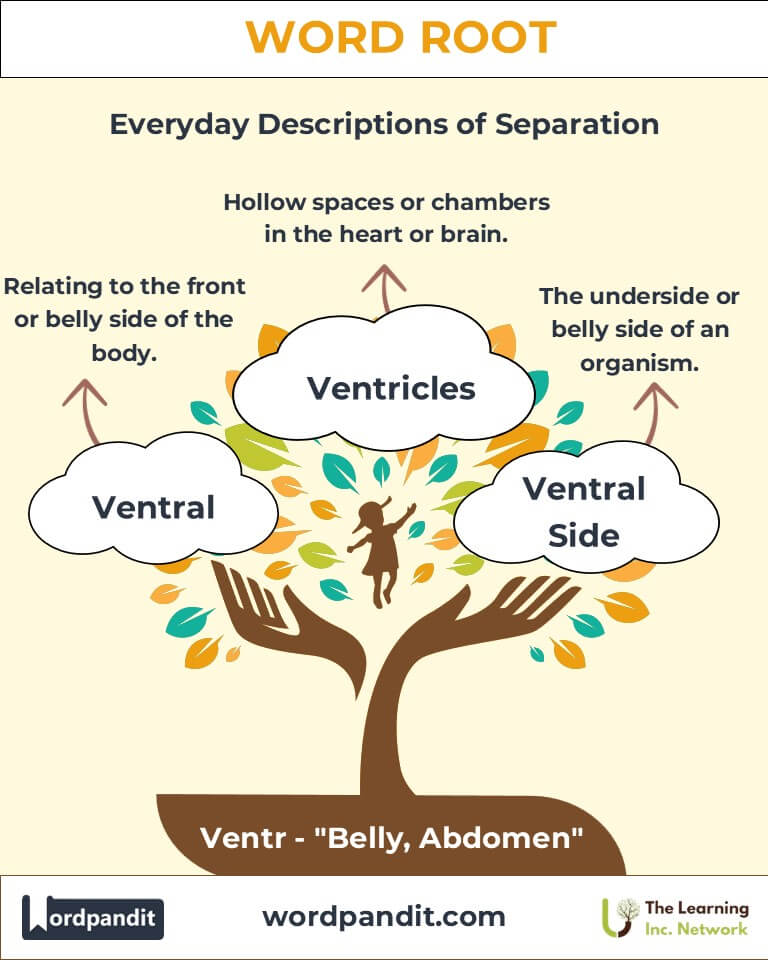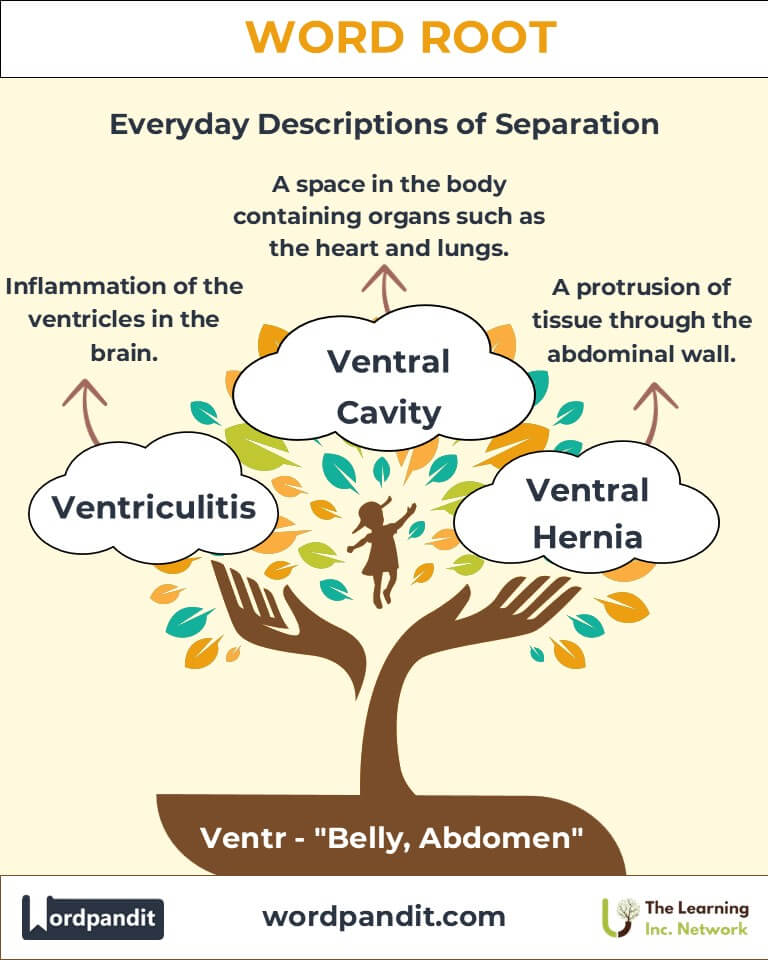Ventr: Exploring the Belly of Language and Anatomy
Discover the intriguing root "ventr", from the Latin word for "belly." This root has shaped words across biology, medicine, and everyday language, highlighting the significance of the belly in both physical and metaphorical contexts.

Table of Contents
- Introduction: The Core of "Ventr"
- Etymology and Historical Journey
- Mnemonic: Unlocking the Power of "Ventr"
- Common "Ventr"-Related Terms
- "Ventr" Through Time
- "Ventr" in Specialized Fields
- Illustrative Story: "Ventr" in Action
- Cultural Significance of the "Ventr" Root
- The "Ventr" Family Tree
- FAQs about the "Ventr" Word Root
- Test Your Knowledge: "Ventr" Word Root Quiz
- Conclusion: The Living Legacy of "Ventr"
1. Introduction: The Core of "Ventr"
The root "ventr," derived from the Latin venter (belly), forms the foundation of words describing the central or lower parts of living organisms. From anatomical terms like ventral to medical phrases like ventricle, this root signifies the physical and symbolic "belly" of life. Its applications range from biology to idiomatic expressions, emphasizing centrality, nourishment, and support.

2. Etymology and Historical Journey
The Latin root venter (meaning "belly") influenced many Romance and English terms. In anatomy, it describes structures in the "belly" or anterior side of an organism, especially in animals. Medieval scholars expanded its use to name body cavities, like the ventricles in the brain and heart. Over centuries, "ventr" evolved to signify centrality and foundational importance, retaining its association with sustenance and function.
3. Mnemonic: Unlocking the Power of "Ventr"
Visualize a tree with its thick, central trunk as the "belly" supporting all branches and leaves. Similarly, "ventr" symbolizes the central or core part of structures.
Mnemonic: "Think of VENTR as the ventral view—the vital belly side of life."
4. Common "Ventr"-Related Terms
- Ventral (ven-truhl):
- Definition: Referring to the front or belly side of an organism.
- Example: "The ventral fins of the fish help it navigate through water."
- Ventricle (ven-trih-kul):
- Definition: A cavity or hollow part within an organ, especially the heart or brain.
- Example: "The heart’s left ventricle pumps oxygen-rich blood to the body."
- Ventriloquist (ven-tril-oh-kwist):
- Definition: A performer who projects their voice as if coming from another source.
- Example: "The ventriloquist amazed the crowd with her lifelike puppet."
- Ventricular (ven-trik-yoo-lar):
- Definition: Relating to the ventricles of the heart or brain.
- Example: "Ventricular fibrillation requires immediate medical intervention."
- Ventral Hernia (ven-truhl hur-nee-uh):
- Definition: A bulge of tissues through the abdominal wall.
- Example: "Surgery was required to repair the ventral hernia."
5. "Ventr" Through Time
- Ventral: Originally a biological term, its application broadened to mean "on the front side" in various species, emphasizing anatomical orientation.
- Ventriloquist: Once referring to the act of "speaking from the belly," this term now denotes skilled performers.
6. "Ventr" in Specialized Fields
- Medicine:
- Ventricle: Describes key hollow structures in the heart and brain crucial for circulation and cerebrospinal fluid flow.
- Zoology:
- Ventral Side: Refers to the belly side of animals, critical in anatomical studies.
- Performing Arts:
- Ventriloquism: Once believed to involve spirits, now a revered entertainment skill.
7. Illustrative Story: "Ventr" in Action
Dr. Carla was a cardiac surgeon tasked with repairing a child’s malformed left ventricle. She explained to the family how the ventricle, the "belly of the heart," is essential for circulating blood. Her successful surgery highlighted the importance of understanding "ventr"-related structures, both as life-giving and central.
8. Cultural Significance of the "Ventr" Root
Historically, the belly or abdomen has been viewed as a source of life and energy. From ancient beliefs about the belly housing emotions to modern medical discoveries, "ventr" encapsulates humanity’s reverence for this core region.

9. The "Ventr" Family Tree
- Abdomin (abdomen): Belly or abdominal region.
- Example: Abdominal muscles.
- Viscer (internal organs): Related to guts.
- Example: Visceral reaction.
- Gastr (stomach): Stomach-related.
- Example: Gastritis (stomach inflammation).

10. FAQs About " Ventr "
Q: What does "ventr" mean, and where does it come from?
A: "Ventr" comes from the Latin word venter, meaning "belly." It refers to the front or central part of an organism, often related to the abdomen or cavities within the body.
Q: What is the significance of the term "ventral" in biology?
A: In biology, "ventral" describes the front or belly side of an organism. For humans, it refers to the side facing forward, while in animals like fish, it points to the underside.
Q: What are ventricles, and where are they found?
A: Ventricles are hollow cavities within organs. In the heart, they pump blood, while in the brain, they circulate cerebrospinal fluid, protecting and nourishing the brain.
Q: How does "ventriloquism" connect to the root "ventr"?
A: Historically, ventriloquism was believed to involve sounds coming from the belly, tying to the root's meaning. Today, it refers to projecting one’s voice as if it originates from another source.
Q: What is a ventral hernia?
A: A ventral hernia occurs when tissues bulge through a weak spot in the abdominal wall, often requiring surgical repair. The name highlights its location on the ventral or belly side.
Q: How is "ventral" different from "dorsal"?
A: While "ventral" refers to the front or belly side, "dorsal" refers to the back or upper side of an organism. These terms are commonly used in anatomy to describe orientation.
Q: Are "ventricle" and "ventral" related linguistically?
A: Yes, both derive from the Latin root venter. "Ventral" describes the front or belly side, while "ventricle" refers to small cavities often central to an organ.
11. Test Your Knowledge: " Ventr " Mastery Quiz
1. What does the root "ventr" mean?
2. Which word describes the front side of an organism?
3. What is a ventricle?
4. What does a ventriloquist do?
5. Which field most commonly uses the term "ventral"?
12. Conclusion: The Living Legacy of "Ventr"
The root "ventr" remains central to understanding anatomy, language, and even cultural beliefs. Whether in describing vital body parts or creating mesmerizing performances, it highlights the enduring significance of the belly as a literal and symbolic core. Explore "ventr" further to appreciate its profound connections across fields!














